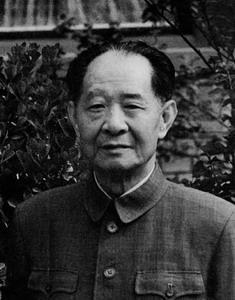Last week, President Xi Jinping and other leaders commemorated the centenary of the birth of former Chinese Communist Party General Secretary Hu Yaobang, who had long been marginalized from Party history after being ousted in 1987 for alleged “bourgeois liberalization.” His death in April 1989 sparked the protest movement at Tiananmen Square.
In this year’s Party commemoration for Hu, his contribution to the country was noted in a way that avoided any mention of his reform credentials in an apparent effort to, “help legitimise the leadership role of the party,” according to Jun Mai of the South China Morning Post:
Hu was sidelined in 1987 for tolerating “bourgeois liberalisation” and his death in 1989 sparked nationwide pro-democracy protests. Zhao was the party’s general secretary who was purged in the aftermath of the demonstrations. The pair were seen by many as liberals within the party.
“They are commemorating their Hu Yaobang, not ours,” one WeChat user wrote.
That official line is in contrast to a ceremony a decade ago to mark the 90th anniversary of Hu’s birth.
In 2005, then-vice-president Zeng Qinghong praised Hu for his “democratic working style” and for “exploring reform” of the state and party leadership, a term that refers to broader involvement in decision making and democracy within the party. Zeng also mentioned some of Hu’s speeches which were seen by party liberals as critical of the Mao Zedong era.
But none of those references were in Xi’s speech on Hu at the Great Hall of the People on Friday. Instead, Xi said the most important thing the party should learn from Hu was his firm faith in communism. [Source]
Zhao Ziyang—Hu’s successor and fellow reformer who was later purged from the Party after the June 4, 1989 military crackdown—is also being erased from history, specifically from a CCTV documentary broadcast about Hu. From another article by Jun Mai:
In one episode of a five-part documentary commemorating the centenary of the birth of late party chief Hu Yaobang, CCTV removed a photograph of Zhao Ziyang from footage showing an edition of the newspaper published 33 years ago.
[…] The change cropped up in a section of the programme reflecting on Hu’s reappointment as party general secretary at the first plenum of the 12th Party Congress in 1982.
CCTV showed a front page from People’s Daily with the headline “Hu Yaobang appointed party general secretary” but the picture of Zhao, a member of the Politburo’s Standing Committee, was replaced by one of Li Xiannian, who was ranked lower at the time than Zhao. Li’s photo was originally in the second row of photos below the fold. [Source]
Airbrushing lives in China! To commemorate the 100th birthday of Hu Yaobang, CCTV documentary wipes out Zhao Ziyang pic.twitter.com/a7TIGHioMK
— John Pomfret 潘文 (@JEPomfret) November 24, 2015
Airbrushing Party leaders who had lost favor out of official photos has been a favorite tactic of propaganda officials since Mao Zedong’s time.
This is just the latest move in the official effort to erase the legacy of Zhao Ziyang. Since Zhao’s death in 2005, his family has not been allowed to bury his ashes alongside those of his late wife in Beijing. In April, authorities finally promised his family that a burial would be allowed, but since then turned down their application for a shared burial site. From Radio Free Asia, via Asia Times:
But 10 years after his death, the family still has no final resting place for Zhao’s ashes, which they wish to bury alongside those of his wife Liang Boqi, who died in late 2013, a source close to the family told RFA.
“The reply was that they couldn’t be interred together,” the source. “They said they would consider it, but they are just dragging things out.”
“Also, they have been told that there is no room in two public cemeteries within Beijing city limits,” the source said. “This is probably because of [interference from] the highest level of leadership.”
Twenty-six years after Zhao fell from power for adopting a too-liberal stance towards the 1989 student-led pro-democracy movement on Tiananamen Square, his remains are still politically sensitive for the administration of President Xi Jinping, the source said. [Source]
Read more about Hu Yaobang and Zhao Ziyang, via CDT.








